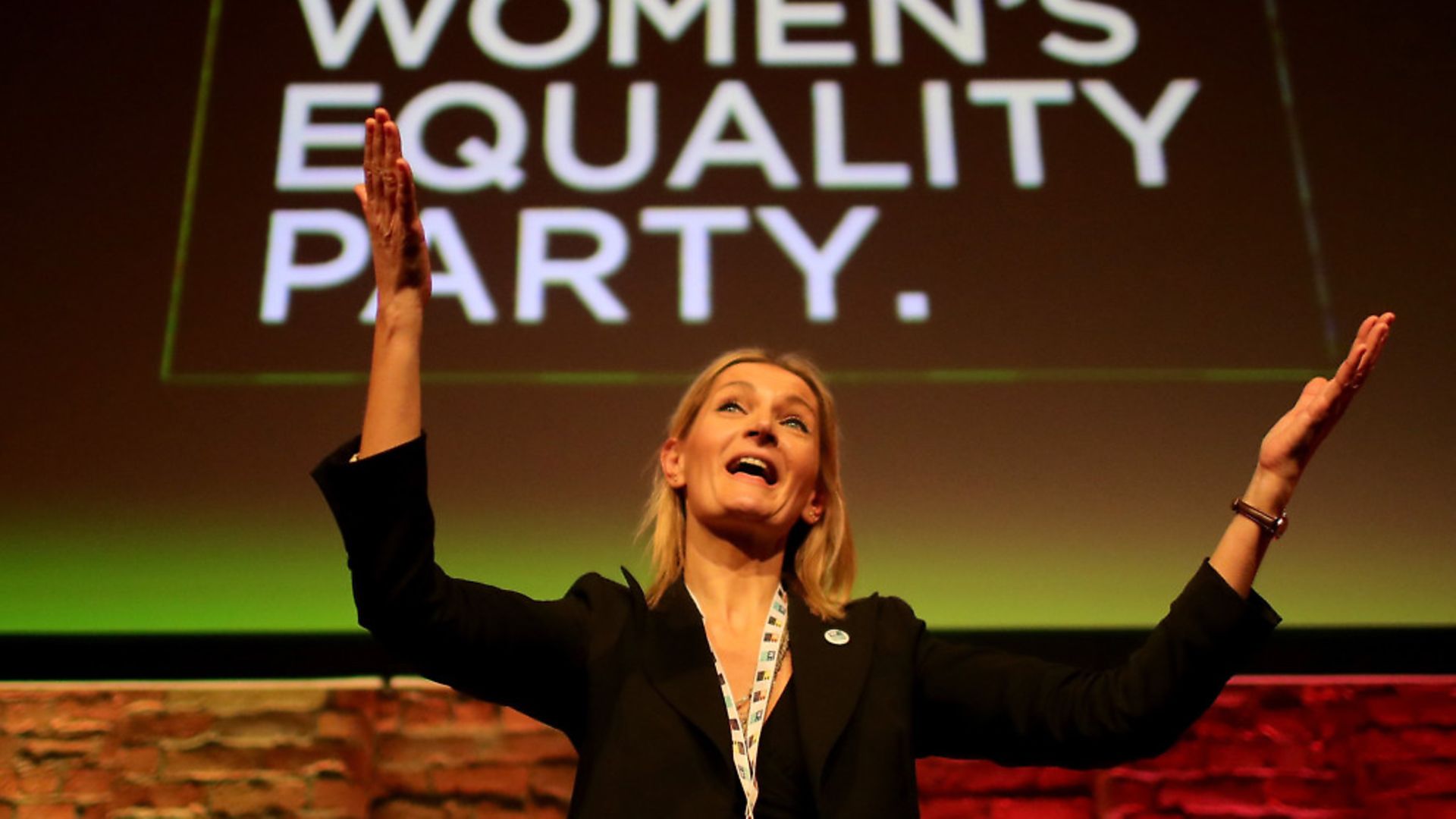
SOPHIE WALKER, leader of the Women’s Equality Party, on how Brexit menaces the feminist cause, and how best to combat it
In the end, it came down to whether we were broadly OK with the idea or not. With no details supplied, it was up to us to provide them; imagination was all. Envisage, conceptualise or just dream it – so long as we could sufficiently distil our aspirations or frustrations into a ‘yes’ or ‘no’ vote.
There was an upside to the binary framing of the EU referendum, though: it opened the doors to huge possibilities, as well as to previously-ignored complexities and thus offered a rare opportunity to reframe policy around those at the margins.
The utter failure of the Conservatives and Labour to present a vision of Brexit that shows any spark of imagination and promise is, then, doubly disappointing. As a result, the Women’s Equality (WE) Party is consulting our members on a change of strategy in order to achieve our vision.
WE have consistently campaigned for a feminist outcome, whatever the final choice on Brexit, because we recognise that this crisis was made possible by years of austerity that targeted women. Women are bearing 86% of the burden of the government’s tax and benefit changes – at a cost of £79 billion to them, compared with £13 billion for men. This has happened because successive governments have constructed an idea of economics that doesn’t see the unpaid, invisible labour that underpins it, and the disproportionate reliance of those invisible women on public spending.
So the Treasury classifies a mother raising two children and caring for her elderly mother as ‘economically inactive’ and cuts her welfare payments, to fund a raise in tax thresholds on the earnings of the husband and brothers she enables to go out to work. Labour, for its part, has no economic view to counter this system.
Making the case for a fairer society is always hard because so much of our media reflects and entrenches the same imbalance as our political system. It was extraordinarily hard during the referendum campaign. Analysis by Loughborough University found that men dominated 85% of press coverage and 75% of television time for a significant period of the campaign.
Meanwhile the EU, though the source of important rights and protections for women, was not called to task for its poor female representation (women make up only a third of the EU parliament) nor for its myopic focus on women who make it past structural barriers to reach the workplace, to the detriment of women who don’t. Its focus on trade liberalisation and ever deeper economic integration has failed to account for and mitigate gender segregation and discrimination.
During the referendum, the boys’ club sat and debated itself and as a ‘them and us’ narrative took hold, it became increasingly clear that ‘them’ referred to women. Since the result, WE have continued our efforts to shape the debate. Working with the Greens, who tabled it, WE brought an amendment to the Article 50 Bill, to highlight the dangers of so-called Henry VIII powers, where the civil servants under the instruction of government can sign away equalities and employment rights without any democratic oversight from parliament. The amendment, however, was thrown out.
Making headway on women’s rights has proved difficult. The Conservative vision for Brexit seems focused on a need for a rebirth for Britain’s manufacturing industry. It’s an obsession for Labour too, with a strategy that prizes the creation of working class men’s jobs above all. Jeremy Corbyn’s recent speech reaffirming his 50-year focus on manufacturing was a slap in the face to millions of women employed in service, retail and health sectors, where jobs and pay are falling.
Investment in workforce strategies in these areas, and free childcare, would boost jobs and productivity far more than a focus on dwindling industries, where investment will only speed further automation. Corbyn’s disdain for ‘cheap labour’ is once again a ‘them and us’ framing that dismisses poor women abroad and at home.
There is no them and us. We have to stop seeing women as some strange special interest group and understand that equality for the ‘other’ half of the population is an essential foundation for stability, democracy and peace. There is no more time to nod at this as a theory – the failure to embed this in policy is damaging all of us.
A feminist approach to economics, trade and social justice offers the way forward. And given the fundamental lack of democracy in a first past the post voting system that has trapped the British electorate between two antediluvian parties that can neither win nor lose a general election effectively, participation in the EU parliament and its fairer voting system is a better opportunity to do this.
It is a chance to fight the rise of the far-right, as Steve Bannon coordinates Europe’s nationalist groups and Boris Johnson tests out abuse of Muslim women on his core UK supporters as an opening salvo. WE are working with Sweden’s Feminist Initiative Party, its leader Gudrun Schyman and Soraya Post, the first party member to be elected to the European Parliament, and support their work to build a feminist bloc within Brussels alongside other developing feminist parties from Finland, Norway, Denmark and Spain.
The case for Remain has become an urgent assertion of our liberty, of transforming the EU project from pale, male and stale bureaucracy to the best arena, where we might protect and extend women’s rights, fend off human rights abuses and defuse violent confrontations within and between states.
WE are working towards a future that sees trade deals as an opportunity to protect human rights as much as shareholders’ rights and where the impact of WTO tariffs on the public purse is mitigated and minimised by investment in public services, with an understanding that this latter is a core driver of GDP growth and social justice simultaneously.
The Women’s Budget Group – which scrutinises government policy from a gender perspective – has shown that an investment of two percent of GDP in construction creates 750,000 jobs while the same investment in care creates 1.5 million jobs, a higher tax revenue base and reduced spending on welfare. With this in mind WE would match investment in physical infrastructure with investment in social infrastructure, and double the size of the fund.
WE are working towards a future where our immigration system will support women rather than hurt them; that appreciates the role of women who embark on these journeys as family carers rather than enforcing dependency on the visa rights of husbands who relocate for work. WE would end the points-based systems that always rely on some kind of asset, income, wealth or skill threshold, and thus always discriminate against women, and restore legal aid to ensure access to protection and justice.
WE are working towards a future where violence against women, climbing as sharply as our social status declines, is ended both by the measures laid out above and by ringfenced and targeted funding for vital women’s services, as well as the retention of the European Protection Order, to ensure victims and survivors of male violence who have been granted protection from their perpetrators will get similar protection when they travel to other EU countries.
In the face of continued contempt from Westminster for the most marginalised people in the UK, I am asking Women’s Equality Party members to work towards all of this by reshaping our position on Brexit at conference in Kettering, in September. We are long past a need to Remain. Let’s make the case to Advance.
Sophie Walker is the leader of the Women’s Equality Party and a former Reuters correspondent of 20 years









